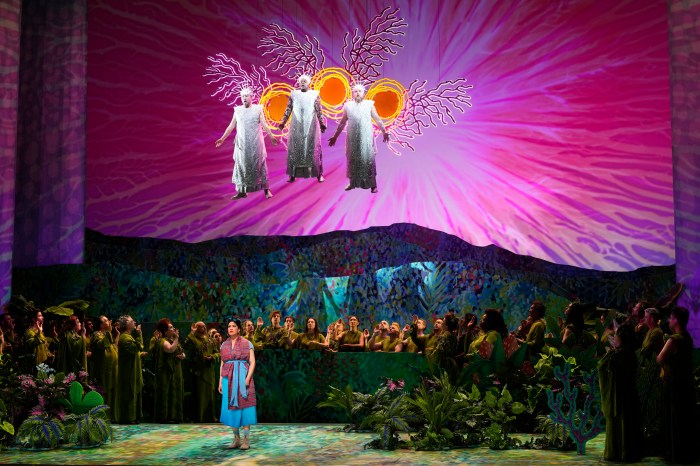“The Simpsons” and the family’s ever-changing scramble to get to their couch have dominated TV screens across the world for almost 30 years, and writer/producer/showrunner Mike Reiss has been there for it all.
As the longest-running animated sitcom of all time, the show has given the world, especially Americans, a forum to discuss the craziness of pop culture and the absurdities of life with lovable but stupid Homer Simpson and his family.
From “predicting” Donald Trump’s run and win for president to fielding criticism for its jokes and characters (including the Indian-American bodega owner Apu), Reiss and his team have tapped into America’s pulse, for better or worse.
Reiss is ready to give up all his secrets from his three decades with “The Simpsons” in a new book called “Springfield Confidential: Jokes, Secrets and Outright Lies from a Lifetime Writing for ‘The Simpsons,’ ” which hits bookstores Tuesday.
“I managed to fill a book,” he told amNewYork. “If you work at a comedy show for 30 years and you don’t have 300 pages of good stories, you haven’t been paying attention.”
On the heels of the release, he’ll be at the Alamo Drafthouse in Brooklyn on June 18 to share some of the stories, secrets and scandals he covers in the book, using rare animated clips during a Q&A session.
We couldn’t wait to find out his “Simpsons” secrets, so we asked our own questions about the show and topics he’ll cover at the Drafthouse.
What is the average writing session like?
There are 20 writers and everybody gets to write one episode a year. And even though they work really hard on it, it gets thrown to the lions. Eight writers sit around a table and go line by line, throwing out jokes until one makes everybody laugh. It’s a real mechanical process, by the time it gets to the air, we’ve rewritten the script from top to bottom eight complete times. Even if you’ve written the greatest script in the world, 80 percent of your material has been changed. It’s a brutal process.
How has writing for the show changed over the years?
The show has stayed completely the same but the perception of it around the world has completely changed. In 1989, it was condemned by President George Bush Sr. and the National Council of Churches. It’s the same show, but now ministers quote the show in their sermons and it was praised by Pope Benedict a few years ago. It makes me think, “Wow, the world has clearly gone right down the toilet.”
We do move a little faster now. When it came on in 1989, it was the fastest thing people had ever seen on TV — our only competition was “The Golden Girls.” Now that the public has caught up with the speed, we have to make it even denser. The pressure is on us to pack even more material into each episode.
It’s been said that “The Simpsons” has predicted so many things that have come to pass. How does that happen?
We love this angle. Suddenly everybody is treating us like great prophets, but I see the show as some homeless guy who has been babbling for 30 years. If you keep babbling long enough, sooner rather than later you’ll get something right. We do a little research in advance, and we care about details. When writing the show, we think about what is the stupidest thing we can imagine happening and a couple of years later, the world does it. President Trump is a great example of that.
What celebrities have been among your favorite guest stars on the show?
We’ve had 800 guest stars and there’s only been three to complain about, though I can’t say their names. The other 797 were just great, like Joe Frazier, a world heavyweight boxing champion. He was given an impossible line on the show (“Brother, Can You Spare Two Dimes?”) that was 35 words long. He fought his way through it like he fought Muhammad Ali. I love that.
Liam Neeson came in and shocked everyone about how funny he is.
I wrote the episode with Michael Jackson, who was at the super peak of his fame and before any scandal came out. He was such a lovely, regular guy.
What do you think has contributed to the show lasting so long?
Nobody gets too attached to the material and gets too big an ego. Each script represents the brainpower of 20 screenwriters. The writers all enjoy each other and trust the actors, and the animators improve whatever we give them. It’s like a kibbutz, except we’re not making orange juice, we’re making episodes of “The Simpsons.”
Nobody realizes that cartoons always run forever. “Family Guy” is about to start its 20th year and South Park is on year 23. Mickey Mouse has been creepy and horrible for 85 years. The only reason other hit shows go off the air is because actors get tired. Seinfeld was tired of being Seinfeld, “Friends” weren’t friends anymore, and Roseanne, well, we know about Roseanne.
Living in New York City must give you a lot of material, no?
It’s always interesting and always exciting. I’ve lived here 12 years and I haven’t been in a taxi. I can walk everywhere. You can barely keep up with it, too. It’s so much more stimulating than living in L.A. My first job right out of college was at National Lampoon magazine. Walking to work, I’d see three amazing things every day and walk into work with three great stories.
To see Reiss at the Alamo Drafthouse, visit drafthouse.com for tickets and to purchase the book. Reiss is hitting up other NYC venues (People’s Improv Theater/The Pit, the Brooklyn Public Library, Powerhouse Arena) for his book tour, so check those out as well.

















